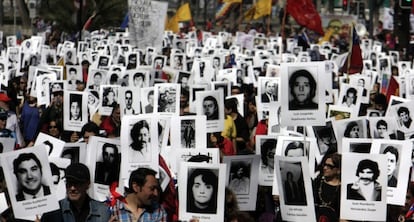Thousands march in Chile to remember victims of the Pinochet dictatorship
A peaceful demonstration turns violent just three days before 40th anniversary of bloody 1973 coup

Three days before Chile marks the 40th anniversary of the bloody coup that plunged it into nearly three decades of a dark dictatorship, more than 20,000 people took to the streets of Santiago on Sunday to remember the victims of the Augusto Pinochet regime.
The march ended at the National Cemetery in the nation’s capital, where hundreds of victims who died at the hands of the military and other oppressors are buried.
The demonstration – which was organized by the National Assembly of Human Rights – was peaceful for the most part until it reached the cemetery for the final ceremony. A large group of hooded protestors set up barricades and started trouble with police. According to Chile’s Carabineros paramilitary police force, some 10 officers were injured, including one who received serious burns from a Molotov cocktail.
The Carabineros reported on Twitter that 31 people were arrested, 15 of them juveniles.
The turnout from Sunday’s march was five times larger than last year’s demonstration. A ceremony was held at the Memorial to the Missing Detained and Executed Politicians, which is located in the center of the cemetery.
This is a country that has not swallowed its history and does not fear its past”
Demonstrators, who carried large portraits of loved ones who remain missing or were executed following the bloody coup, passed about three blocks from La Moneda presidential palace, where in 1973 President Salvador Allende committed suicide as the air force bombed the building and ground troops stood ready to seize it.
According to human rights organizations, 3,214 people were killed during Pinochet’s 1973-1990 dictatorship. Some 1,000 people also remain unaccounted for.
“This is a beautiful demonstration to show that this is a country that has not swallowed its history and does not fear its past,” said Lorena Pizarro, president of the Association of Families of the Missing Detained. “Truth, justice and memory are fundamental to build a country that takes a hard look at itself – not criminals or impunity.”
The violence began shortly after 2pm when the march was ending. At the entrance of the cemetery about a dozen hooded protestors began setting up barricades and destroyed public transport facilities. As soon as the riot police arrived, the violence began. Officials said around 250 demonstrators took part in the confrontations.
To mark the occasion, several official ceremonies are expected to be held on Wednesday. Conservative President Sebastián Piñera will hold a ceremony at La Moneda while former President Michelle Bachelet, who is running to win a second term this year, will preside over a separate ceremony sponsored by the center-left parties that are supporting her candidacy.
Tu suscripción se está usando en otro dispositivo
¿Quieres añadir otro usuario a tu suscripción?
Si continúas leyendo en este dispositivo, no se podrá leer en el otro.
FlechaTu suscripción se está usando en otro dispositivo y solo puedes acceder a EL PAÍS desde un dispositivo a la vez.
Si quieres compartir tu cuenta, cambia tu suscripción a la modalidad Premium, así podrás añadir otro usuario. Cada uno accederá con su propia cuenta de email, lo que os permitirá personalizar vuestra experiencia en EL PAÍS.
En el caso de no saber quién está usando tu cuenta, te recomendamos cambiar tu contraseña aquí.
Si decides continuar compartiendo tu cuenta, este mensaje se mostrará en tu dispositivo y en el de la otra persona que está usando tu cuenta de forma indefinida, afectando a tu experiencia de lectura. Puedes consultar aquí los términos y condiciones de la suscripción digital.







































